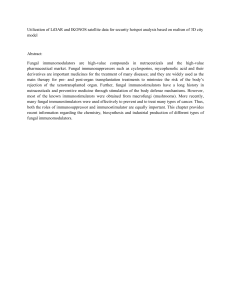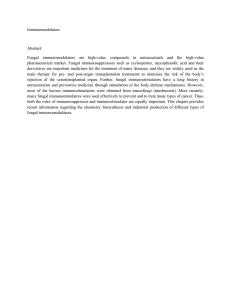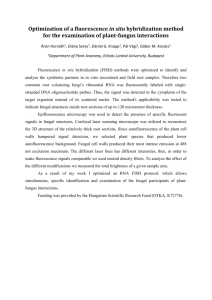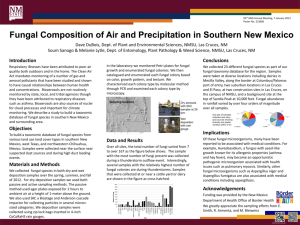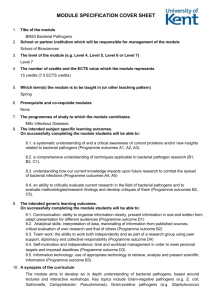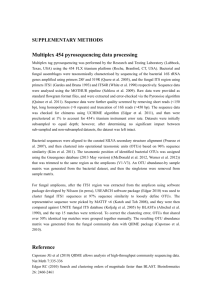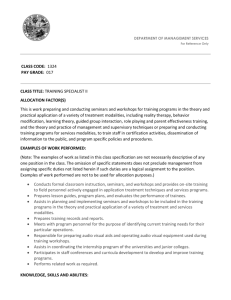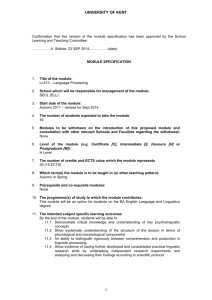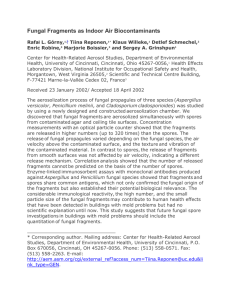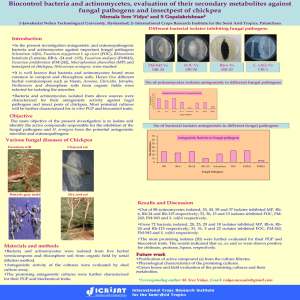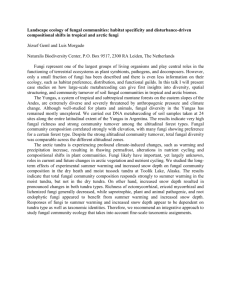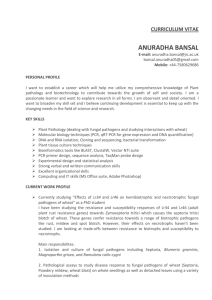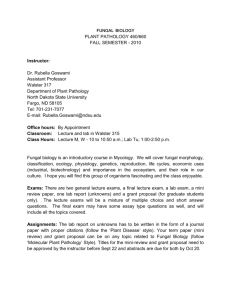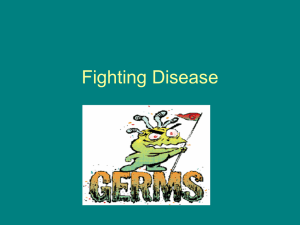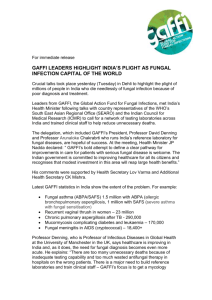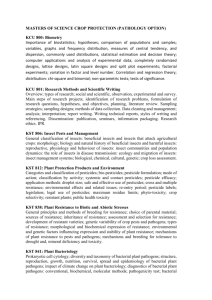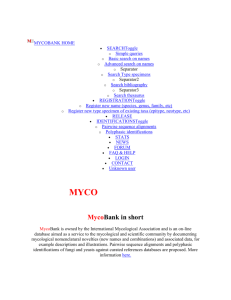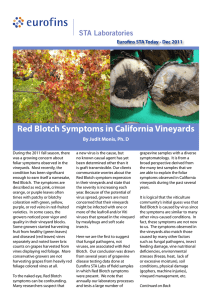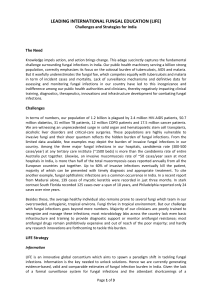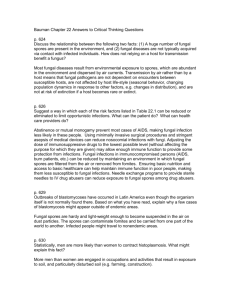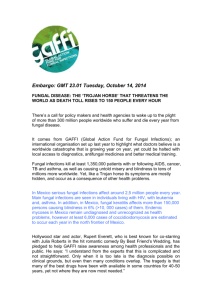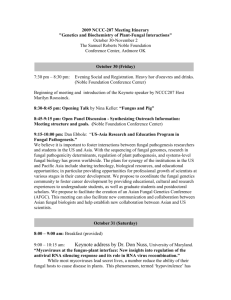Biosciences - University of Kent
advertisement
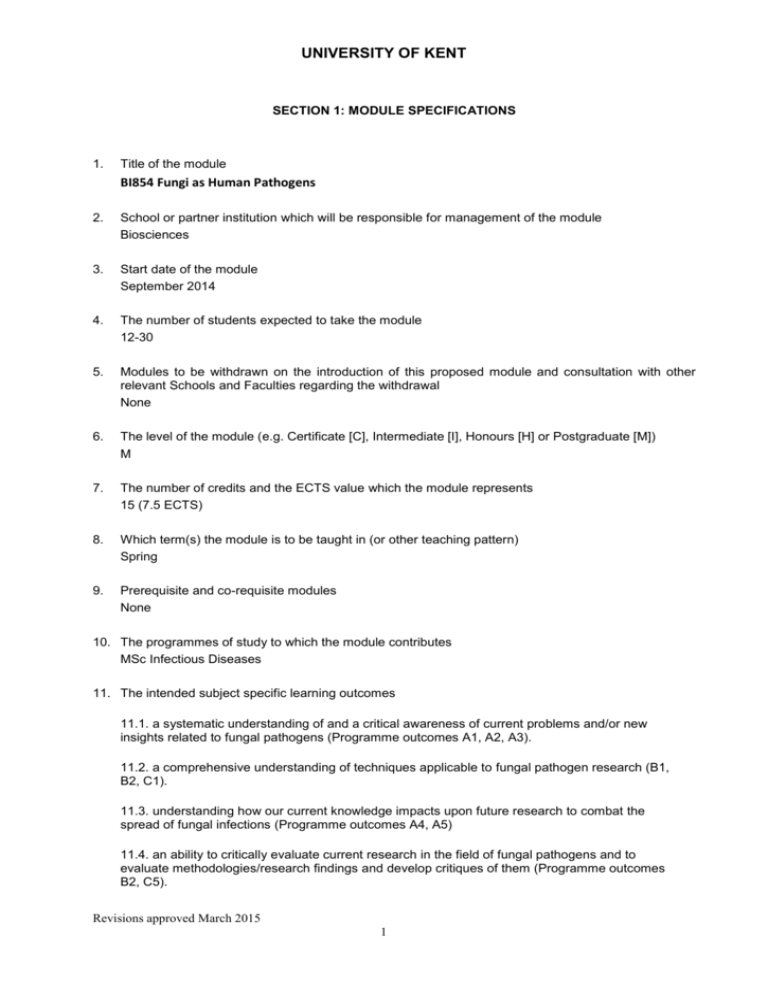
UNIVERSITY OF KENT SECTION 1: MODULE SPECIFICATIONS 1. Title of the module BI854 Fungi as Human Pathogens 2. School or partner institution which will be responsible for management of the module Biosciences 3. Start date of the module September 2014 4. The number of students expected to take the module 12-30 5. Modules to be withdrawn on the introduction of this proposed module and consultation with other relevant Schools and Faculties regarding the withdrawal None 6. The level of the module (e.g. Certificate [C], Intermediate [I], Honours [H] or Postgraduate [M]) M 7. The number of credits and the ECTS value which the module represents 15 (7.5 ECTS) 8. Which term(s) the module is to be taught in (or other teaching pattern) Spring 9. Prerequisite and co-requisite modules None 10. The programmes of study to which the module contributes MSc Infectious Diseases 11. The intended subject specific learning outcomes 11.1. a systematic understanding of and a critical awareness of current problems and/or new insights related to fungal pathogens (Programme outcomes A1, A2, A3). 11.2. a comprehensive understanding of techniques applicable to fungal pathogen research (B1, B2, C1). 11.3. understanding how our current knowledge impacts upon future research to combat the spread of fungal infections (Programme outcomes A4, A5) 11.4. an ability to critically evaluate current research in the field of fungal pathogens and to evaluate methodologies/research findings and develop critiques of them (Programme outcomes B2, C5). Revisions approved March 2015 1 UNIVERSITY OF KENT 12. The intended generic learning outcomes 12.1. Communication: ability to organise information clearly, present information in oral and written form, adapt presentation for different audiences (Programme outcome D1) 12.2. Analytical skills: interpretation of data, marshalling of information from published sources, critical evaluation of own research and that of others (Programme outcome B2) 12.3. Team work: the ability to work both independently and as part of a research group using peer support, diplomacy and collective responsibility (Programme outcome D4) 12.4. Self-motivation and independence: time and workload management in order to meet personal targets and imposed deadlines (Programme outcome D3) 12.5. Information technology: use of appropriate technology to retrieve, analyse and present scientific information (Programme outcome B3) 13. A synopsis of the curriculum The module aims to develop an in depth understanding of fungal pathogens, based around lectures and interactive workshops. Key topics include severe, recurrent and chronic fungal diseases (such as cryptococcal meningitis, candidiasis and chronic pulmonary aspergillosis).and molecular mechanisms underlying resistance to anti-fungal drugs. The module will involve a rotation of seminars covering key theoretical concepts, mechanistic insights into host:pathogen interactions, and discussion of practical approaches to combat the spread of fungal infections. These will be accompanied by interactive workshops wherein students will analyse, present and discuss the relevant research literature. The students will gain experience in scientific design, literature analysis, scientific communication and the analysis and interpretation of complex experimental data. 14. Indicative Reading List The reading list will be research articles, which will be used to drive a case-study based approach to learning. Students will be provided with their own copies of this reading material, but in some cases they will be set tasks for receiving appropriate journal articles to which we already have access. 15. Learning and Teaching Methods, including the nature and number of contact hours and the total study hours which will be expected of students, and how these relate to achievement of the intended module learning outcomes Subject specific knowledge will be delivered in seminars supported by reference to the recommended scientific literature. Problem solving skills will be developed in discussion sessions and will be based on the understanding and interpretation of experimental data. (Module learning outcomes 11.1, 11.2, 11.3, 11.4) Generic skills will be developed in discussion sessions, presentations, outside reading and exam preparation (Module learning outcomes 12.1, 12.2, 12.3, 12.4, 12.5). Contact hours 28: Seminars/discussion sessions (8x3h). Journal club presentations (1 h). Laboratory workshop: (3h). Self-study (122): Preparation for seminars/workshops (50 hours), Revisions approved March 2015 2 UNIVERSITY OF KENT Laboratory workshop (12 hours) Presentation (15 hours) Revision and exam preparation (45 hours) 16. Assessment methods and how these relate to testing achievement of the intended module learning outcomes Methods: Article evaluation worksheets (short worksheets to be used for preparation of weekly in-class discussions) 10%. Module learning outcomes 11.1, 11.2, 11.3, 11.4, 12.2, 12.4. Oral presentation (journal club-style presentation) 25%. Module learning outcomes 11.1, 11.2, 11.3, 11.4, 12.1, 12.4, 12.5. Examination (2 x 1h essays): 40%. Module learning outcomes 11.1, 11.2, 11.3, 11.4, 12.1, 12.2, 12.4. Laboratory workshop. Group and individual work to investigate the modes of anti-fungal drug action: 25%. Module learning outcomes: 11.2, 11.3, 12.2, 12.3, & 12.5. 17. Implications for learning resources, including staff, library, IT and space This module will feature small-group workshops, journal clubs and seminars rather than traditional lectures, and emphasis will be placed on self-directed reading and study. 18. The School recognises and has embedded the expectations of current disability equality legislation, and supports students with a declared disability or special educational need in its teaching. Within this module we will make reasonable adjustments wherever necessary, including additional or substitute materials, teaching modes or assessment methods for students who have declared and discussed their learning support needs. Arrangements for students with declared disabilities will be made on an individual basis, in consultation with the University’s/Collaborative Partner’s (delete as applicable) disability/dyslexia support service, and specialist support will be provided where needed. 19. Campus(es) where module will be delivered: Canterbury Revisions approved March 2015 3 UNIVERSITY OF KENT SECTION 2: MODULE IS PART OF A PROGRAMME OF STUDY IN A UNIVERSITY SCHOOL Statement by the School Director of Learning and Teaching/School Director of Graduate Studies (as appropriate): "I confirm I have been consulted on the above module proposal and have given advice on the correct procedures and required content of module proposals" ................................................................ .............................................. Director of Learning and Teaching/Director of Graduate Studies (delete as applicable) Date ………………………………………………… Print Name Statement by the Head of School: "I confirm that the School has approved the introduction of the module and, where the module is proposed by School staff, will be responsible for its resourcing" ................................................................. .............................................. Head of School Date ……………………………………………………. Print Name Revisions approved March 2015 4
